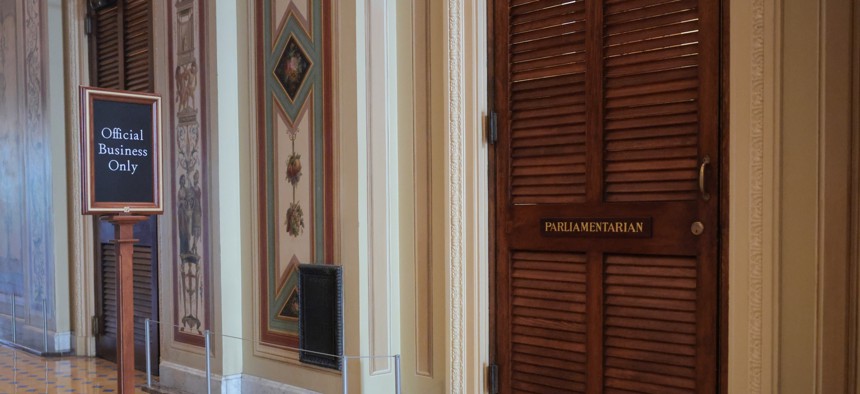
The doors to the Senate Parliamentarian's office are seen in the U.S. Capitol on June 23, 2025. The Senate Finance Committee began its “Byrd Bath” review process of President Donald Trump's “One Big Beautiful Bill" Act. This process refers to a specific review of legislation named after the late Sen. Robert Byrd, D-W.V. Kayla Bartkowski / Getty Images
Most fed-targeting provisions in Senate reconciliation bill don’t pass Byrd muster
The Senate parliamentarian over the weekend found that many proposals targeting federal workers and their unions violate the Byrd rule and would require 60 votes to advance in the chamber.
A series of plans targeting federal workers’ retirement benefits, their unions and civil service protections were dealt a setback over the weekend when the Senate parliamentarian warned that they violate rules governing budget reconciliation initiatives.
Last week, Senate Homeland Security and Governmental Affairs Committee Chairman Rand Paul, R-Ky., unveiled his panel’s portion of congressional Republicans’ budget reconciliation package, which aims to reduce federal spending to partially pay for extended tax cuts for the ultrawealthy and increased immigration enforcement. The measure abandoned a series of House-passed proposals to cut the retirement benefits of currently serving federal workers but would have required future federal hires to pay nearly 15% of their paychecks toward their retirement benefits if they wished to accrue civil service protections.
But Sen. Jeff Merkley, D-Ore., top Democrat on the Senate Budget Committee, announced Sunday that the Senate parliamentarian had ruled that most of the Senate’s proposals governing federal benefits and workforce policies violated the Byrd rule, which aims to limit reconciliation measure—and its simple majority threshold for passage—to topics that are budgetary in nature.
“There is no better way to define this big beautiful betrayal of a bill than families lose and billionaires win,” he said. “Democrats are on the side of families and workers and are scrutinizing this bill piece by piece to ensure Republicans can’t use the reconciliation process to force their anti-worker policies on the American people. The Byrd Rule is enshrined in law for a reason, and Democrats are making sure it is enforced.”
Provisions that would require a 60-vote majority to advance include the plan to require all new federal employees to pay 9.4% toward the Federal Employees Retirement System and to choose between paying an additional 5 percentage points toward FERS or serving as at-will employees; a requirement that federal employees challenging an adverse action before the Merit Systems Protection Board pay a $350 filing fee, as well as a proposal to charge federal employee unions for use of agency property and official time on a quarterly basis.
The parliamentarian also said that a provision effectively giving the Trump administration “carte blanche” to reorganize federal agencies and lay off thousands of federal workers would similarly run afoul of the Byrd rule. Earlier this month, Senate Majority Leader John Thune told reporters that he would not consider overruling the parliamentarian as part of the bid to send the reconciliation package to President Trump’s desk by July 4.
Still remaining in the package is a provision tasking the Office of Personnel Management with conducting an audit of enrollees in the Federal Employees Health Benefits Program to ensure family members remain eligible as dependents, and a requirement that the government charge a 10% fee on deductions from federal workers paychecks, such as unions dues and charitable contributions as part of the Combined Federal Campaign.
In a statement, National Treasury Employees Union National President Doreen Greenwald praised the rulings.
“We are glad the Senate parliamentarian agreed that many of the harmful federal employee provisions contained in the draft budget reconciliation package were not a real attempt to save money, but instead an attempt to use the budget reconciliation process to make significant changes to civil service policies,” she said. “As this process continues to move forward, NTEU will keep up the fight to protect employee pay, benefits and workforce rights from those who are determined to harm frontline federal employees around the country who work hard every day to serve the American people, and to weaken the unions that represent them.”
How are these changes affecting you? Share your newstips with us:
Erich Wagner: ewagner@govexec.com; Signal: ewagner.47
NEXT STORY: OPM’s new performance management rules are (mostly) spot on







